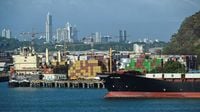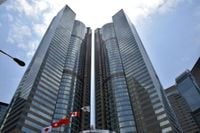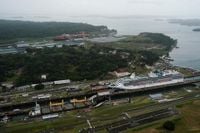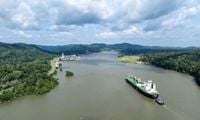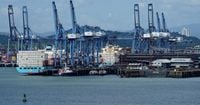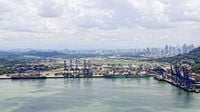In a significant development that underscores the geopolitical tensions between the United States and China, Hong Kong conglomerate CK Hutchison, led by billionaire Li Ka-shing, has announced it will not sign a deal next week to sell its two strategic ports at the Panama Canal to a consortium led by BlackRock. This decision comes just days before the expected signing date of April 2, 2025, and highlights the complexities surrounding the sale of these vital assets.
The deal, which was initially announced on March 4, 2025, was projected to generate over $19 billion for CK Hutchison, which operates two of the five ports adjacent to the Panama Canal, a crucial waterway that handles approximately 3% of global sea-borne trade. The Panama Canal has been a focal point of tension, with U.S. President Donald Trump expressing his desire to regain control over the strategic waterway, claiming it is "operated by China." However, it is important to clarify that Panama itself manages the canal, having taken over from the United States in 1999.
Chinese authorities have reacted negatively to the proposed sale, reflecting a broader reluctance to cede ownership of assets that hold significant strategic value for Beijing. According to reports, Xi Jinping was reportedly furious that CK Hutchison did not seek Beijing's approval prior to the announcement of the deal. In response, Chinese regulatory agencies have initiated an antitrust investigation into the transaction, aiming to protect fair competition and safeguard public interests. This investigation was confirmed by the State Administration for Market Regulation, which stated, "We have started an investigation into the deal in accordance with the law to protect fair competition in the market and safeguard the public interest."
The backlash against the sale has been amplified by pro-Beijing media outlets, particularly the Hong Kong newspaper Ta Kung Pao, which published a series of articles criticizing the deal as a betrayal of national interests and a collaboration with U.S. strategies to contain China. The publication warned that "dancing with" U.S. politicians would lead to "the condemnation of history." This rhetoric has fueled speculation that Beijing may take steps to block the sale, further complicating the already fraught relations between Hong Kong's business elites and the Chinese government.
CK Hutchison's ports in Balboa and Cristóbal have been operated by a subsidiary since 1997, and the company was awarded the concession to run these ports in 1998, which was extended for another 25 years in 2021. The proposed sale to BlackRock, the world's largest asset manager with $11.6 trillion in assets, was seen as a strategic move by CK Hutchison to "de-risk" from geopolitical tensions and secure a lucrative exit from its overseas port operations.
However, the increasing scrutiny from Beijing reflects a growing distrust of Hong Kong's business leaders, particularly in light of the political climate following the 2019 protests and the subsequent imposition of the National Security Law. The Chinese Communist Party (CCP) has been tightening its grip on Hong Kong, and the pressure on CK Hutchison is indicative of a broader strategy to assert control over the territory's business landscape.
Despite the challenges, CK Hutchison has not officially called off the deal. Sources indicate that negotiations are still ongoing, and the April 2 signing date is not a hard deadline. The company has not publicly commented on the specific reasons for delaying the signing, but insiders suggest it may be due to "obvious reasons" related to the political climate.
The Panama Canal itself is a crucial passage for both commercial and military vessels, with about 4% of the world’s maritime trade and over 40% of U.S. container traffic passing through it. The canal generated nearly $5 billion in profits in 2024, accounting for 23.6% of Panama's annual income, according to a study released by IDB Invest.
As tensions escalate, the implications of the CK Hutchison deal extend beyond the immediate business interests at stake. The situation illustrates the intricate interplay between corporate decisions and national security concerns, particularly as the Trump administration continues to impose tariffs on Chinese goods and seeks to limit Chinese influence in strategic sectors.
Furthermore, the potential fallout from this deal could have lasting effects on Hong Kong's business environment. Analysts warn that if Beijing intervenes to block the sale, it may set a precedent for further encroachments on the autonomy of Hong Kong's private sector. Such actions could compel businesses to align more closely with the Chinese government's political goals, limiting their ability to pursue independent commercial interests.
As the situation develops, the business community in Hong Kong remains on edge, grappling with the reality that their operations may increasingly be subject to the whims of the Chinese government. The question now is not whether Beijing will act against CK Hutchison, but how far it is willing to go to assert its influence over Hong Kong's economic landscape.
In summary, the CK Hutchison port sale has become a flashpoint in the ongoing geopolitical struggle between the U.S. and China, with implications that could reshape the future of Hong Kong's business environment and its relationship with the mainland. As negotiations continue, all eyes will be on how this high-stakes game unfolds in the coming weeks.
